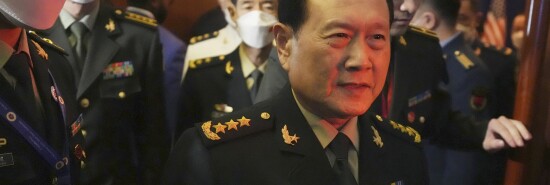
US should give up on near-term defense minister meeting with China
Tom Rogan
Video Embed
The Biden administration is right to seek reliable lines of communication with China. That pursuit is key to mitigating any miscommunication that might lead to miscalculation that, in turn, might lead to conflict.
Still, it is a mistake for the United States to continue pushing for a near-term meeting between Defense Secretary Lloyd Austin and his Chinese counterpart Wei Fenghe. Beijing has just rejected a U.S. request that Wei and Austin meet on the sidelines of the Shangri-La summit in Singapore this weekend. Explaining why Beijing rejected that meeting, a People’s Liberation Army spokesperson declared that “the current difficulties in the exchanges between the two militaries are entirely on the U.S. side.”
BIDEN WORKS TO PUSH DEBT CEILING DEAL OVER THE FINISH LINE
The U.S. has been pushing hard for communication between Wei and Austin, and Indo-Pacific Command’s commanding officer Adm. John Aquilino and a PLA officer, possibly a vice chairman of the Central Military Commission. The problem is that by pushing so hard when China isn’t biting, the U.S. plays to Beijing’s belief that it can extract concessions in return simply for those meetings. This is a bad message to send a government that is fixated on extracting concessions from the U.S. wherever it can.
At least thus far, the Biden administration has held off from removing Trump-era sanctions on Wei. Beijing has suggested that would be enough to get Austin and Wei together. But Washington must stand firm on the baseline that Beijing already accepts for mid-ranking U.S. military-PLA communications. Namely, that said communication serves a common interest in avoiding undesired miscalculation. And as an extension, that these communications should be kept separate from other give-take engagements in bilateral relations.
The respectful broadcasting of clear expectations is important. Again, however, the interest in getting talks back on a trajectory of business as usual is key. While the U.S. might gain some small diplomatic victory for showing it is Beijing, not Washington, that is obstructing high-level communication, for example, these public relations battles also antagonize Beijing and make talks harder.
This cuts to the deeper concern in the U.S.-China military relationship. While neither nation wants war, neither nation is able to give up that which is fueling the path to war. The U.S. cannot stop operating in international airspace and waters in the East and South China Seas. Doing so would send the catastrophic message to regional allies and partners that China owns those areas. It would degrade the sovereignty of nations as established by the post-1945 democratic order and the credibility of the U.S. as the guarantor of that order. At the same time, the PLA cannot stop pressing against the U.S. because Chinese President Xi Jinping has decided his control over China’s territorial periphery, especially over Taiwan, is a prerequisite for his securing both his personal and the Chinese Communist Party’s strategic destiny.
We saw an example of this in the just-disclosed unprofessional intercept of a U.S. spy plane by a PLA fighter jet over the South China Sea. The U.S. released a video of the incident, showing the PLA was at fault. Still, a spokesperson for the PLA’s Southern Theater Command claimed, “It was entirely the villain who filed the complaint first … making false accusations in an attempt to confuse the international audience.” The spokesperson demanded the U.S. military avoid PLA training areas in the future, “otherwise, the U.S. will bear all consequences arising therefrom.” Beijing’s Global Times newspaper summed up China’s attitude, explaining that where the U.S. military acts proximate to China, “we must pick up a stick and drive him away.”
Top line: Some communication is critical, and high-level communication is preferable. But this is not a situation in which U.S. concessions in return simply for communication will bear strategic fruit.
